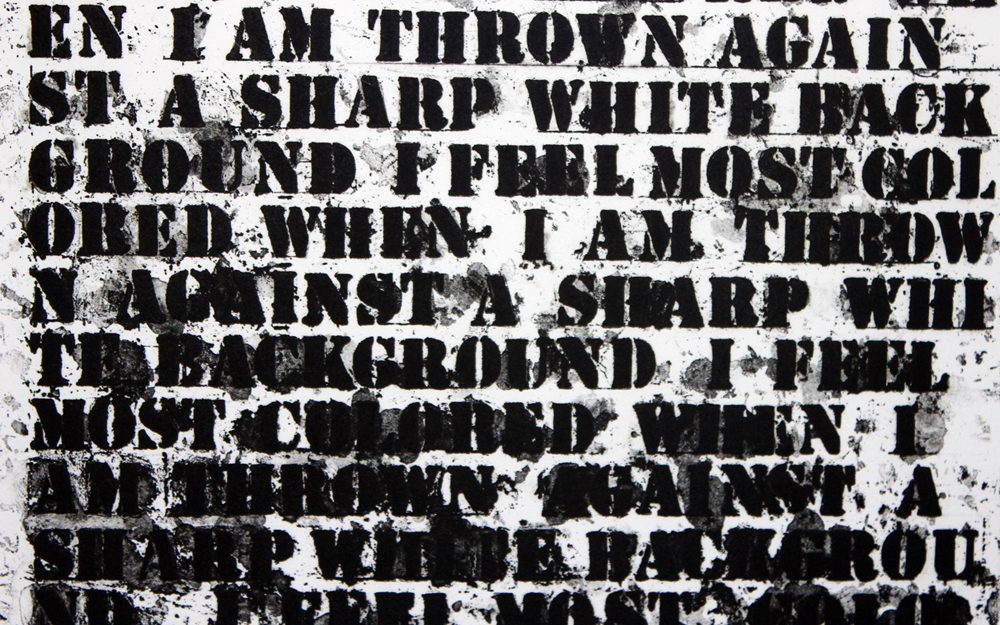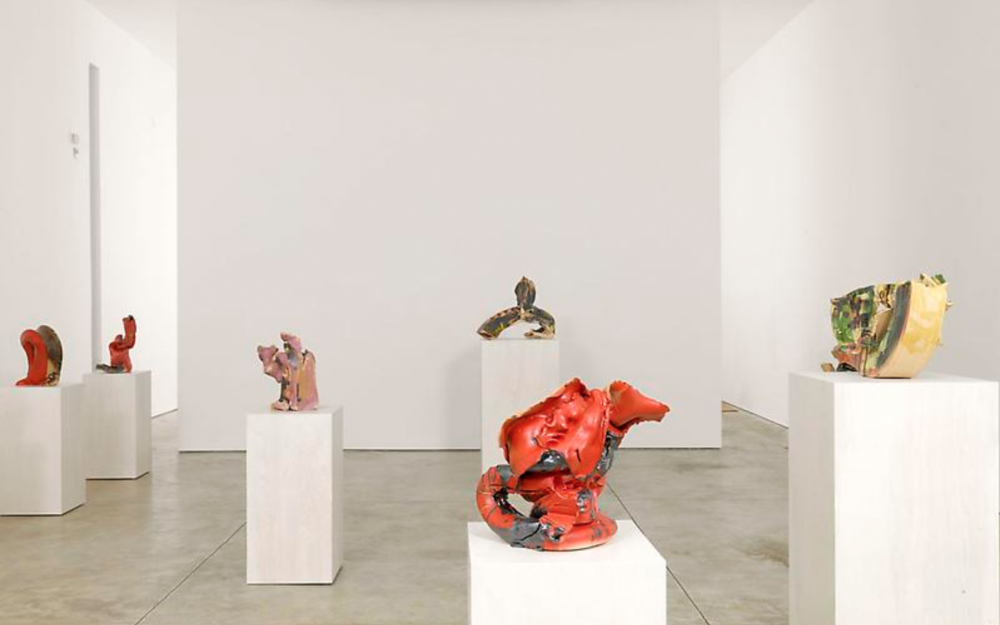Passing Strange
Hannah Miet joins the "(De)Tangled" series with a personal essay on her experience as a white woman who has allowed her hair to obscure her identity.

Detail of Glenn Ligon's Untitled (Four Etchings), 1992.
As much as I hate to break it to you, dear reader, especially because it means repeating it to myself, I must confess: I am white. I am a white woman. As much as it pains me to admit this, I feel like we ought to start out on a basis of honesty.
There was a year in my life when I was dating a Black Panther, and ran with an activist circle that included several Black Panthers, and may have even considered myself to be a Black Panther, though I wouldn’t have said that aloud at the time. I accessorized this crisis of identity with elephant-print headwraps, wooden bangle bracelets, and Black Star blaring from my apartment. I’m pretty sure the only reason I got away with it was because of my hair, which is not “curly” so much as it is kinky, and grows out rather than down, forming a perfect, large circle around my small head. In other words, I rock a Jew-fro.
The other white women in our activist circle, who did not rock Jew-fros nor have the capacity to rock Jew-fros, seemed to run into more problems. Our group met once a week at different members’ apartments, familiarizing me with neighborhoods where (at the time) my non-activist white friends would not have considered stepping off the subway: the South Bronx, Flatbush, and Bedford-Stuyvesant (this was before Peaches, Do or Dine, and Outpost’s “Bed-Stuy Chai”). Like most activist groups in existence, we spent a good 25 percent of our energy arguing amongst ourselves. One frequent subject for consideration was whether specific white members of the group were overstepping their boundaries as allies.
I was never called out in these discussions. In fact, the Black Panther I was dating would openly discuss with me the issues he was having with other white members on our long rides from the outer boroughs back to my Harlem apartment, where he’d massage my shoulders, burn me CDs, and we’d cuddle like cats. I grew to cherish my role as a confidant to this intuitive and intelligent man. He trusted me enough to lend me his spacious apartment in Brooklyn while he was on tour with his band, allowing me to escape my cramped studio. I proceeded to invite friends over without explaining that it wasn’t my place. I watched as they scanned the life-size sculpture of a (literal) black panther in the entranceway and the Malcolm X books on the shelf, too afraid to ask questions. I reported back to him gleefully on this experiment.
I will assume that there are many reasons besides my hair that allowed me to play this role in his life. As for the group, it probably didn’t hurt that I remained pretty quiet. I showed up to protest the lack of accountability for the officers who killed Sean Bell, Malcolm Ferguson, and Amadou Diallo, but I wasn’t exactly on the front lines. The other members of the group may have even thought I was only at these rallies to support my boo. Another likely reason no one challenged my feeling of oneness with a marginalized people despite a life of white privilege, was that I was 19, and very stoned. While there was a lot happening on top of my head, there was very little self-reflection happening within it.
It was my sophomore year of college, and I couldn’t make it through a class without stepping out to take a hit off my pipe in a public bathroom, in a storage closet, or walking down Madison Avenue blowing my smoke away from the businessmen in crisp suits (or at them, if I was feeling bold) without worrying too much about cops. (Did I mention the white privilege?) Suffice it to say, I was living a rather unexamined life.
The weed came with its own identity. The most popular poster in college dorm rooms circa 2007, and probably now and forever, was Bob Marley smoking a joint against a red, yellow, and green backdrop. Since I lived in Harlem and went to a commuter school, I didn’t have a dorm room. But I definitely had a Bob Marley poster—a postcard-sized black-and-white version framed from some knick-knack shop on St. Mark’s Place because I thought that was classier. Most of my friends at the time wore Rasta beads and went to reggae festivals, had freestyle battles and wrote slam poetry about police brutality. Admittedly, not all of those friends were white, but absolutely none were actual Rastafarians. Most of us were bonded together not by political activism, sisterhood, or even by our questionable fashion choices, but by the fact that we all smoked weed everyday and couldn’t really function around people who didn’t. When the only culture you have is drugs, you grab onto everything that is loosely associated so that your world seems bigger.
A few years later, my Rasta beads and elephant-print headwraps buried deep in the closet, I lived for a summer in New Orleans, where my skin got sweaty and dark in the heat and my hair grew larger thanks to the humidity and a talented hairdresser named Selma. I became a regular at Bullet’s in Treme on Tuesday nights for Kermit Ruffins’ set. Within a couple of weeks, I was on friendly terms with the regulars, the bartenders, and Ruffins, who much to my delight had complimented my haircut. When friends from New York came to visit, I took them with me. Some of them, specifically the ones who were not white, danced and felt at ease. But others, specifically the white friends, expressed their discomfort.
“I didn’t realize that we would be the only white people here,” one friend whispered.
“New Orleans is 60 percent black,” I whispered back, unwilling to reflect. When you’re ethnically ambiguous, you fit in almost everywhere, or at least you seem less like a blatant outsider. And maybe some of that is that you feel like less of an outsider.
Not only have I very rarely faced any kind of discrimination based on my perceived race (and I know Jews face persecution elsewhere, but I grew up in Brooklyn and now live in Los Angeles, where we do just fine, thanks), I have often benefited from being what a Beverly Hills casting agent I met at a party once called “ethnically white.” The casting agent described an ethnically white woman as someone who everyone can feel comfortable with—someone who could sell you toothpaste, or bacon cheeseburgers, or your own soul on a platter. It’s embarrassing to admit, as I am about to now, that while I no longer smoke weed or consider my cultural heritage to be linked invisibly to Jamaica, in the deep core of my soul, I am still complimented when someone assumes I am something other than white. When an Uber driver asks, “Where are you from?” And I say, “New York,” and they say, “But where are you from really? You look Dominican.” Or, “You look mixed.” Or, simply, “I can’t place it.” My gut reaction is to assume this means I am beautiful.
The issue of my own cultural appropriation aside, the fact is, my life would be much different if there were different strands sprouting from my skull, and I don’t think it would be better. I don’t think my first friends in elementary school would have been black. I don’t think I would have had a life where I was able to slip through social groups and exist outside of racial tension without really being forced to think about it. And I don’t think, no, in fact I’m quite certain, that I ever would have had a Black Panther phase, which was as loving as it was instructive. I don’t really know what to do with that, other than to get honest about it. So I’d like to make it clear, one last time for the people in the nosebleed seats who might not have heard me the first time: I’m a white woman with a lot of kinky, curly hair, and my fair skin grows very dark in the sun. I’m sorry for the confusion this has caused you, and most of all, the confusion it’s caused me.



